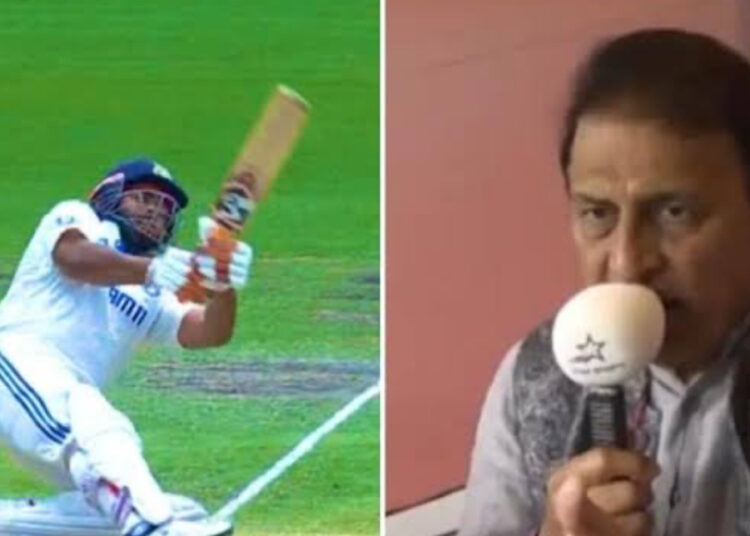Sunil Gavaskar, a legend of Indian cricket, has always been vocal in his opinions, whether it was in the past or more recently. But he tends to forget the age-old way of life is to ‘give respect to get respect:. It is all about mutual respect and the values that should be upheld within the cricketing world. However, his reactions, particularly when it comes to Rishabh Pant during the fourth Test in Melbourne, have sparked a debate — whether it is right way to call a current cricket stupid on air like he did repeatedly.
Gavaskar’s strong reaction to IPL commissioner Lalit Modi being reprimand by the BCCI was a prime example of him standing up for what he felt was a misstep by the board. Days before Modi was suspended by the Indian board, Gavaskar was critical of the BCCI’s treatment of Modi, who had played a pivotal role in the IPL’s growth and, by extension, in generating significant revenue for Indian cricket. For Gavaskar, the word “reprimand” seemed too harsh, given Modi’s contribution to the game’s financial success.
Years later, Gavaskar’s sharp critique of Pant, particularly after a rash stroke led to his dismissal, revealed a more critical side of the former captain. While it’s natural for senior players and commentators to express disappointment when a young player, especially someone as talented as Pant, throws away his wicket, Gavaskar’s repeated use of the word “stupid” felt excessive to some. In that moment, Gavaskar was visibly upset and repeated the word as if to highlights the seriousness of Pant’s mistake. His suggestion that Pant should “get into the Australian dressing room” was a metaphorical way of saying the keeper-batter needed to learn discipline and maturity in his batting.
However, criticism like this can be problematic, especially when directed in such a harsh manner at a current player. Pant, like many young cricketers, has immense potential, but he’s still learning and evolving. While it’s perfectly acceptable for experts to express their opinions, the tone and language used can sometimes go too far, especially when calling a player “stupid.” Such words can be demoralizing and don’t always contribute to constructive criticism.
It’s important to remember that young players, despite their occasional mistakes, deserve respect and encouragement, just as Gavaskar demanded respect for the players and people around him in his time. He should also keep in mind that even Test cricket strokes are more instinctive than that of planning. Constructive criticism is necessary, but it should be delivered in a way that builds rather than tears down, helping players like Pant grow rather than feeling undermined by harsh words.
Pant’s response, or rather lack of it, to Gavaskar’s criticism speaks volumes about how players often perceive disrespectful or overly harsh comments. As a cricketer with immense talent, Pant is fully aware of his strengths and weaknesses, and he doesn’t need the added pressure of being labeled “stupid” by a cricketing great like Gavaskar. After all, players make mistakes, and in the case of Pant, it’s often his aggressive nature and fearless approach that leads to both brilliance and folly.
If that same shot had gone for six, a Gavaskar type of a commentator would likely have been full of praise, celebrating Pant’s audacity and match-winning potential. This is one of the ironies of the game—when a player takes a risk and it pays off, he’s hailed as a genius. But when that same risk results in a dismissal, the same player is criticized harshly for his “recklessness” or lack of discipline. The problem lies in the inconsistency of reactions, especially when it comes to commentary.
The larger issue here is the tone of commentary, particularly from former greats like Gavaskar, whose words carry weight. While constructive criticism is necessary, it’s important to remember that players like Pant deserve guidance more than scorn. In moments of frustration, players may not always process criticism in a positive light, especially when it feels overly harsh or unfairly targeted. Disrespectful remarks, regardless of intent, can quickly erode the connection between commentators and players, reducing the impact of any valuable feedback.
In the end, the game is about encouraging growth and performance, not just in terms of technical ability but also in handling pressure. Pant, like any young cricketer, is bound to have highs and lows, but it’s essential that these moments be treated with the understanding that failure is part of the journey. Ultimately, respect and a supportive environment contribute more to a player’s growth than harsh, unwarranted criticism. Ironically on the same day, Nitish Reddy’s family was at Gavaskar’s feet at the end of day’s play as a mark of respect for one of the best Indian batsmen. It was meant to celebrate Nitish’s maiden hundred in Test cricket. So, it’s like Jo Jeeta Wohi Sikandar!

















Your point of view caught my eye and was very interesting. Thanks. I have a question for you.